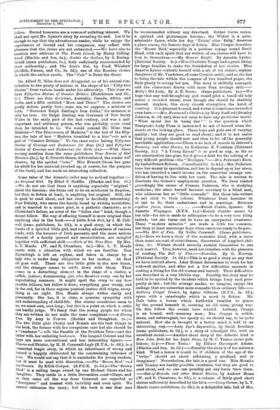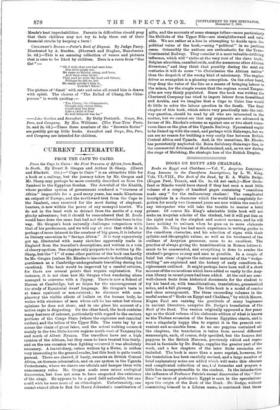Some tales of the domestic order may be noticed together
:— In Original Girl. By Ethel F. Heddle. (Blackie and Son. 69.) —We do not see that there is anything especially " original " about the heroine ; she turns out to be an aristocrat in disguise, but that, in fiction at least, is anything but original. Still, she is good to read about, and her story is decidedly interesting. Poor Felicity, who earns the family bread by writing novelettes, and is married. to a minor poet, is a pathetic character; so is Christobel's father, an actor of the "fallen star" kind, though a decent fellow. His way of effacing himself is more original than anything else in the book.—A Little Irish Girl, by J. M. Call- well (same publishers, 2s. 6d.), is a good story, in which the freaks of a spirited little girl, and sundry adventures of various kinds, with the humour of Irish peasants, and the more serious element of a family quarrel and reconciliation, are mingled together with sufficient skill.—Girls of the True Blue. By Mrs. L. T. Meade. (W. and R. Chambers. 6s.)—Mrs. L. T. Meade starts with a situation with which we are familiar. Nan Easterleigh is left an orphan, and taken in charge by a lady who is under deep obligation to her mother. At first all goes well. There are two little girls in the new home, and the stranger seems to settle down with them. Then comes in a disturbing element in the shape of a visitor, a selfish, jealous, domineering girl, who deceives every one by her ingratiating manners. It might spoil the story to say how trouble follows, but follow it does ; everything goes wrong, and in the end, for in these regions poetical justice still reigns, every- thing is set right. Mrs. Meade always writes easily and pleasantly. She has, it is clear, a genuine sympathy with and understanding of child-life. Her stories sometimes seem to us, we must own, over-long ; but this is a point on which a critic can hardly judge. We fancy that the young people for whom they are written do not make the same complaint. —A Cherry Tres. By Amy le Fenvre. (Hodder and Stoughton. 2s.)— The two little girls Cherry and Bonnie aro the best things in the book, the former with her scrupulous care lest she should be a "cumberer "—viffe the Parable of the Fruitless Tree—and the latter with her unfailing bonhomie. The languid Colonel and the boys are more conventional and less interesting figures. Thorns and Thistles, by M. H. Cornwall-Legh (R. T.S., is. 6d.), is a somewhat tragic story, in which an inheritance of wrong and hatred is happily obliterated by the constraining influence of love. We would not say that it is unsuitable for young readers, but it must be used with discretion.—The Brown Bird 'and her Owners. By Edith Cowper. (S.P.C.K. 2s. 6d.)—The Brown Bird' is a sailing barge owned by one Michael Carne and his daughter. They settle in a little Devonshire coast-village, and as they came all the way from Cornwall are regarded as "foreigners-" and treated with incivility and even spite. We cannot epitomise the story; but the book is one that may be recommended without any drawback. Esther Came makes a spirited and picturesque heroine ; the Widow is a quite admirable figure, while her dog Trixie,' alias Baby,' deserves a place among the famous dogs of fiction. Miss Cowper describes the • Brown Bird,' especially in a perilous voyage round Devil Head, with such spirit that our writers of sea-stories will have to look to themselves,—My Honour Bright. By Annette Lyster. (National Society. 2s.)—Miss Charlotte Yonge had a great liking for large families to make the foundation of her stories. Miss- Annette Lyster contents herself with a set of six sisters, orphan daughters of Mr. Vandeleur, of some Cornish castle; and as she has to bring the tale within the compass of two hundred pages, she finds plenty to occupy her pen. The story is skilfully managed, and the characters drawn with more than average skill.— Molly's Old Lady. By A. E. Drane. (Same publishers. la.)—We hope that any well-brought-up girl would pilot a timid old lady across a crowded street, even though she should be shabbily dressed. Anyhow, this story should strengthen the habit of courtesy. It is pleasant to read, and virtue is sometimes rewarded even here.—Mrs. Hammond's Children, by Mary Stafford (Brimley Johnson, 4s. 6d. net), does not seem to have any particular moral. "What moral lies in being fair ? " is the question which Tennyson's Lady Flora is instructed to ask of herself when ehe stands at the looking-glass. These boys and girls are of varying quality ; but they are good to read about ; and it is not amiss that young people should now and then be let off the generally inevitable application.—There is.no lack of morals in Deborah's Dressing, and other Stories, by Katherine E. Vernham (National Society, 2s.) "A Young Rascal" is as good as any, as far as our examination has gone, for it gives a hint for the solving of a very difficult problem—the "Hooligan."—Mrs. Pederson's Niece. By Isabel Stuart Robson. (Cassell and Co. 3s. 6d.) —Mrs. Pederson loses her money in speculation, and has to depend upon her niece, who has inherited a small income on the somewhat strange con- dition of having to live with her aunt. The tale is written' to illustrate the women's employment question. We have related accordingly the career of Frances Pederson, Who is studying medicine; the niece herself becomes secretary to a blind man who addresses her as "little comrade." But these tale-writers do not stick to their colours. Whatever their heroines do or fail to do, their endeavours end in marriage. Nat uram expeitas furca, tamen • Keziah Crabbe, Spinster. By Annette Whymper. (R.T.S ls.)—Keziah Crabbe seems bY her talk—for she is made to soliloquise—to be a very sour thing indeed; but she turns out to have an unexpected sweetness. These "modern miracles" are made a little too common, but they at least encourage hope when one is too ready to despair.
The Hill of Fire. By Nellie Cornwall. (Same publishers. as.)—Here we have a story of the romantic kind, with a more than usual amount of coincidences, discoveries of long-lost chil- dren, &c. Writers should severely restrict themselves to one such marvel. This, however, need not interfere with the pleasure of reading The Hill of Fire.—Iliverslea. By G. Norway. (National Society. le. 6d.)—This is as good a story as any that we have noticed above. Luoy Bennet determines to work for her widowed mother, and after not a few difficulties succeeds in making a living for the old woman and herself. Their difficulties are described in a very lifelike way. Possibly the story may be held to be spoiled by the incident which brings Lucy such pros- perity at last ; but the average reader, we imagine, enjoys the endings that are somewhat more romantic than ordinary life. Anthony Craggs' Tenant, by Agnes Giberne (R.T.S., 2s. 6d.), opens with a catastrophe which is novel in fiction. Mr. Dale takes a house which forthwith tumbles to pieces by the ground beneath it, covering an old mine, giving way. On this follow the events here related. Anthony Craggs is an honest, well - meaning man ; Mrs. Craggs is selfish, mean, and extravagant, too openly so, we should say, to be quite natural. How she is brought to a better mind is told in an interesting way.—Lady Dye's Reparation, by Sarah Doudney (same publishers, 2s. 6d.), is a story of schoolgirl life, with an excellent moral.—Another short story of the didactic kind is How John Dale Let his Light Shine, by M. C. Trance (same pub. lishers, ls.)—Those Twins! By Ellinor Davenport Adams. (Blackie and Son. 2s. 6d.)—Possibly the story is of too serious a kind. What a terror it would be if children of the age of the " twins " should set about reforming a prodigal, real or imaginary ! Nevertheless, the tale is a good one. Miss Horatia and Tommy are hardly possible creatures, but they are good to read about, and no one can possibly get any harm from them. —Out.of-Bounds, and other School Stories, by Andrew Home (W. and R. Chambers, 3s. 6d.), is a volume of fairly good short stories sufficiently described by the title. —Cosey Corner, by L. T. Meade (same publishers. as. 64.). is a deliehtfid tale, full of Mrs.
'Meade's best improbabilities. Parents in difficulties should pray that their children may not try to help them out of their financial straits by keeping a farm !































































 Previous page
Previous page